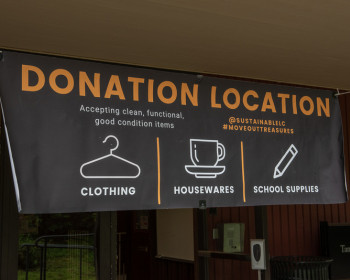Campus Safety launches new bike patrol program
Open gallery

This fall, Campus Safety launched a new program that will allow officers to patrol the undergraduate, graduate, and law campuses by bike most evenings—the busiest time for Campus Safety. We sat down with Campus Safety Officers Brian Furlong and Rob Maisonet and Campus Safety Supervisor Mark Nisbett to learn more about this effort and how it benefits our community.
Where did the idea for doing bike patrols come from?
Rob: During a number of conversations, the subject of how incredibly gorgeous our campus is, especially during the summer months, inspired the idea that we could better enjoy this environment while conserving natural resources.
How do you think bike patrols will benefit Lewis & Clark?
Mark: I’m hoping the bike patrol will give our students an opportunity to get to know Campus Safety. We have an exceptional group of officers who work here, and I’m excited for the L&C community to find this out.
Brian: I agree with Mark. Bike patrols put us within reach of the community and foster a sense of accessibility.
There are also financial and environmental benefits. Campus Safety is committed to the responsible management of the budget. Bike patrols save gas and other operating expenditures, which is a good thing. Environmentally speaking, bikes reduce our carbon footprint and environmental impact. That’s consistent with stewardship and sustainability goals campus leadership strives toward at L&C.
What do you think are the advantages of doing campus safety work by bike?
Mark: Officers can patrol areas of the campus our trucks can’t get to, and they are more accessible to visitors and students. The big pay off is the officers are getting fit, and they’re having fun doing it!
Brian: Our campus has earned its place on the list of most beautiful campuses for many reasons, including its unique, forest-like setting and striking views. However, it has some specific challenges given this setting. As Mark points out, a large part of our campus is not accessible by vehicle. Bicycles enable us to reach parts of the campus not accessible by cars. This allows us to patrol campus more thoroughly and offer an increased level of service to the campus community.
What are you personally most looking forward to about doing your job on a bike, and what do you think will be most challenging aspect of this change?
Brian: There are many health benefits to riding a bike…and I get paid at the same time! On a broader note, Portland has a large, well-defined, vibrant bicycle culture. Riding a bike helps me to connect to the culture, which is also active at L&C.
The bike limits some typical functions but augments others. For example, because a bike cannot travel at the same speed as a car, it’s not as effective in performing traffic safety enforcement. On the other hand, it’s a nimble tool that enables us to reach the deeper recesses of the campus to ensure student safety. Bikes go where cars can’t.
Rob: Challenges? I like to say that there aren’t any challenges, but realistically both rain and some of the hills can be challenging. Being that we live in the Pacific Northwest, I’m sure that we’ll get the opportunity to endure some uphill riding in the rain!
Just being able to stop and engage in a conversation with members of our community will be a huge benefit. Already, students have been more willing to approach us and ask us questions when we’re on bikes.
Feeling inspired to get on your bike? Don’t forget that September is Bike Commute Challenge Month. Find out how you can get involved in Lewis & Clark’s cycling community.
More Sustainability at Lewis & Clark Stories
Sustainability Office is located in Fowler Student Center on the Undergraduate Campus.
MSC: 134
email advorak@lclark.edu
voice 503-768-7794
Senior Director of Sustainability Amy Dvorak
Sustainability Office
Lewis & Clark
615 S. Palatine Hill Road
Portland OR 97219
Office Hours: Thursdays 1 - 3:00 p.m.

